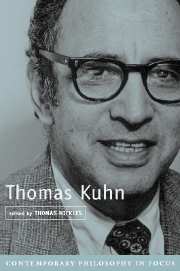Book contents
- Frontmatter
- Contents
- Contributors
- Preface
- Introduction
- 1 Kuhn and Logical Empiricism
- 2 Thomas Kuhn and French Philosophy of Science
- 3 Normal Science and Dogmatism, Paradigms and Progress: Kuhn ‘versus’ Popper and Lakatos
- 4 Kuhn's Philosophy of Scientific Practice
- 5 Thomas Kuhn and the Problem of Social Order in Science
- 6 Normal Science: From Logic to Case-Based and Model-Based Reasoning
- 7 Kuhn, Conceptual Change, and Cognitive Science
- 8 Kuhn on Concepts and Categorization
- 9 Kuhn's World Changes
- 10 Does The Structure of Scientific Revolutions Permit a Feminist Revolution in Science?
- Selected References in English
- Index
- References
5 - Thomas Kuhn and the Problem of Social Order in Science
Published online by Cambridge University Press: 07 December 2009
- Frontmatter
- Contents
- Contributors
- Preface
- Introduction
- 1 Kuhn and Logical Empiricism
- 2 Thomas Kuhn and French Philosophy of Science
- 3 Normal Science and Dogmatism, Paradigms and Progress: Kuhn ‘versus’ Popper and Lakatos
- 4 Kuhn's Philosophy of Scientific Practice
- 5 Thomas Kuhn and the Problem of Social Order in Science
- 6 Normal Science: From Logic to Case-Based and Model-Based Reasoning
- 7 Kuhn, Conceptual Change, and Cognitive Science
- 8 Kuhn on Concepts and Categorization
- 9 Kuhn's World Changes
- 10 Does The Structure of Scientific Revolutions Permit a Feminist Revolution in Science?
- Selected References in English
- Index
- References
Summary
Scientific knowledge, like language, is intrinsically the common property of a group or else nothing at all. To understand it we shall need to know the special characteristics of the groups that create and use it.
Kuhn (1970, p. 210)PREAMBLE
Any attempt to evaluate the contribution of Thomas Kuhn's work to the history and sociology of science has to take care not to undermine the significance of the work itself; for the more respect we have for it, the less we will be inclined to attribute decisive significance to it as an individual contribution to these fields. Kuhn helped to undermine the view that cultural traditions like those of the sciences could be analysed into so many discrete individual contributions. Indeed, the part he played in correcting the excessive individualism that once characterised studies of the natural sciences stands as an important part of his achievement, acknowledged even today, when individualism is once more rampant in the academic world.
It is worth recalling that, at the outset of Kuhn's career, the ‘problem’ of the nature of the ‘discoveries’ made by individual scientists still figured prominently in the thought of historians of science. In an early paper, Kuhn (1962) cited extensive evidence, and in particular the many documented cases of ‘multiple’ and ‘simultaneous’ discovery, in support of the view that discovery was actually a process wherein the members of the relevant scientific community reoriented themselves cognitively, over an extended period of time, to the states of affairs their research addressed.
- Type
- Chapter
- Information
- Thomas Kuhn , pp. 122 - 141Publisher: Cambridge University PressPrint publication year: 2002
References
- 1
- Cited by



